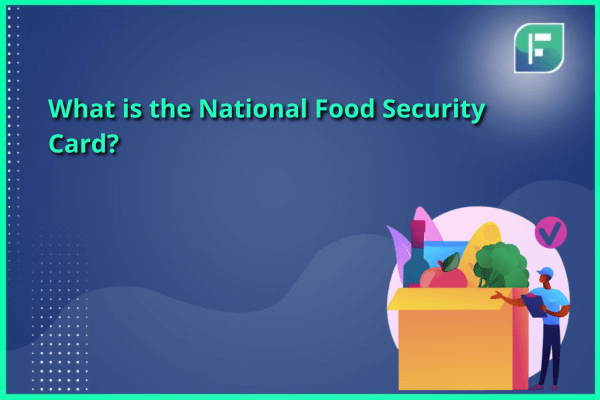The document referred to as the National Food Security Card, additionally known as the Food Security Ration Card, gives cardholders with right to important items like rice, sugar, fertilisers, kerosene, and LPG at decreased charges. Through the ‘One Nation One Ration’, cardholders can buy essentials from any ration shop. Furthermore, the card serves as a flexible file, serving as legitimate evidence of identity for each of the cardholder and their families.
Benefits of National Food Security Card
As proposed in the Food Security Act, the objective of the National Food Security Card is to ensure access to food and nutrition for the population through benefits previously available through the public distribution system and targeted public distribution system convergence and expansion. The main benefits are:
1. Food subsidy for below poverty line (BPL):
The card provides subsidised meals to those who buy below the poverty line.
2. Nutritional Support and Reproductive Benefits:
Pregnant and lactating mothers receive nutritional support and reproductive benefits, contributing to their well-being.
3. Children under 14 at lunch:
Children under 14 receive lunch in government-run schools, promoting nutrition and education.
4. Recognition of the Eldest Daughter as Head of Household:
The act acknowledges the eldest daughter as the head of the household on the ration card, ensuring inclusive benefit distribution.
5. Mechanism for Addressing Concerns:
The State and district administrations offer a Grievance Redressal Mechanism, providing cardholders with a structured avenue to address concerns and complaints.
6. Food Security Allowance:
In situations where individuals cannot access food according to the scheme, the act provides a food security allowance as a support measure.
One Nation One Ration
As of June 1, 2020, the ‘One Nation One Ration Card’ scheme was introduced, bringing about the portability of food security benefits. The primary objective of this scheme is to facilitate the accessibility of food grains for migrant beneficiaries under the National Food Security Card Act. The ONORC scheme allows them to avail of essential commodities from any Fair Price Shop across the country, utilising their existing ration card and undergoing biometric authentication.
Subsidised Food Access Nationwide
Under the ONORC scheme, poor migrant workers now have the flexibility to purchase subsidised rice and wheat from any ration shop in the country. To ensure eligibility, it is imperative to link your ration card with your Aadhaar.
As of March 2021, 32 states and Union Territories have adopted the ONORC scheme, except Assam, Chhattisgarh, Delhi and West Bengal. It is mandatory that nationwide implementation of ONORC be completed by July 31, 2021 without exception.
National Food Security Act, 1999
The National Food Security Act of 2013 plays an important role in ensuring fundamental human rights of Indian citizens as enshrined in Article 21 of the Constitution.
Pre-NFSA Situation: Public Distribution Systems
Before the NFSA, the government managed matters related to food through the Public Distribution System and the Targeted Public Distribution System.
NFSA Implementation
On July 4, 2013, the Union Cabinet accredited the National Food Security bill, marking a massive change. This legislative degree brought massive benefits to over sixty seven % of the population.
Primary Goal: UN’s Hunger Eradication Objective
The primary intention of the NFSA aligns with the United Nations’ worldwide agenda to remove hunger with the aid by 2030. Through its provisions, the NFSA targets to ensure meals security and address the broader right to live for the residents of India.
National Food Security Card Eligibility
To qualify for the National Food Security Card Program, individuals must meet the following criteria.
1. No owner of an existing licenced FSC: Applicants must not hold a currently licenced FSC.
2. Members of low-income groups: Eligibility is extended to persons belonging to low-income groups.
3. Marital Status: Applicants must be married.
4. Possession of temporary ration card: Persons holding or expired temporary ration cards are eligible.
Documents required for the National Food Safety Card
The following documents are required in order to apply for the National Food Safety Card.
1. Application Form: A duly completed application form is required for registration.
2. Aadhaar Proof: Submit the Aadhaar as officially identity card is mandatory.
3. Proof of address: The application process require a proof of address, such as a rental agreement or electricity bill.
Procuring the One Nation One Ration Card
As in keeping with the guidelines of Hon’ble Supreme Court, all states and union territories of India ought to enforce Ek Rashtra Ek Ration Card Scheme with the aid of July 31, 2021. Further, the Supreme Court has directed states to set up community kitchens aiming to maintain migrant employees till the cease of the epidemic.
Individuals possessing the white ration card are entitled to avail the ration portability facility. This provision allows them to purchase subsidised food grains from any Fair Price Shop located anywhere in the country.
Final Thoughts
The National Food Security Card performs an critical function in making sure access to basic necessities for low-income individuals of the society. Projects like ‘Ek Rashtra Ek Ration Card’ inspire portability, presenting beneficiaries with access to food in whole country. The emphasis on required documents, along with evidence of Aadhaar and verification of residential deal with, demonstrates a dedication to transparency and responsibility. The national implementation of the scheme, in accordance with the directions of the Hon’ble Supreme Court, pursuits at decreasing meals insecurity and enhancing public welfare. Functioning as a multi-purpose record, the National Food Security Card not only facilitates access to subsidised food but also emphasises its important contribution to social well-being and the whole population they will also emphasise self-promotion, which is also a valid proof of identity.






